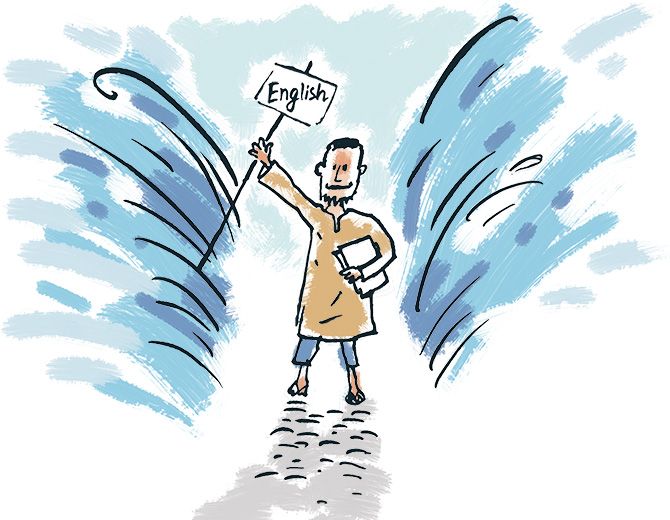'No other language can now take its place. English is the language of professional education, which gives you a passport to a bright future,' says T N Ninan.
Illustration: Dominic Xavier/Rediff.com

In the welter of typically gloomy numbers put out last month in Pratham's Annual Status of Education Report (ASER) for 2017, there is a remarkable piece of statistic: That 58 per cent of the sample -- taken from 14 to 18 year olds in rural areas -- could read a simple sentence in English.
And four in every five of them could explain what the sentence meant. That makes it 46 per cent of the total who could not just read but also understand simple English sentences -- and this is in rural India.
Compare this with what the Census said in 2001: That only 12 per cent of Indians used English as a second or third language (a minuscule 0.2 per cent mentioned English as the mother-tongue or first language).
English featured next only to Hindi as a second language, and marginally outscored Hindi as a third language.
Clubbing these two categories, there was a total of 129.3 million who used Hindi as a second or third language, compared to 125.1 million for English.
Hindi was, of course, by far the most commonly used first language, but more people spoke English in some form than any regional Indian language.
The ASER findings are based on a relatively small sample, for a specific age group, whereas the Census undertakes universal enrolment. So one should hesitate to draw firm conclusions from comparisons of numbers from such dissimilar sources.
Still, it is hard to ignore a jump from 12.2 per cent being users of English in 2001 to 58 per cent of rural youngsters being able to read and understand a simple sentence in English in 2017, especially since other data confirm the spread of English.
A study by KPMG and Google for 2016 reported last summer that out of 409 million Internet users in the country, 175 million accessed the World Wide Web in English. That makes it 43 per cent of the total compared to 12.8 per cent English speakers in 2001.
Of course, most of the growth in Internet usage is increasingly in Indian languages, so the percentage accessing it in English will fall. But the number for English users of the Internet grew by more than 150 per cent in five years, from 68 million in 2011, and will keep growing even as its share of total users falls.
The older test for real knowledge of a language -- namely, newspaper readership -- shows that English has a long way to go.
The Indian Readership Survey for 2017 reports that 28 million read English language newspapers, or just 7 per cent of a total of 409 million.
What is more, as with the Internet, it is the readership of non-English newspapers that has been growing faster.
It would seem that, while a basic knowledge of English has spread with remarkable speed, real familiarity and comfort with the language still has some miles to go.
The triumph of English, never politically favoured, is to be welcomed because poor proficiency in the language is India's ultimate class barrier.
No other language can now take its place. English is the language of professional education, which gives you a passport to a bright future.
It is the operative language in medium and large companies where most youngsters would like to work, and the language of the Supreme Court and some of the high courts.
If you don't know good English, your life chances and choices get severely diminished, as do your chances of going overseas.
That explains why the Mumbai municipal corporation has had to shut down dozens of Marathi-medium schools over the years. Responding to the virtual halving of student numbers in its Marathi-medium schools it has recently converted 57 into bilingual ones, with English as an additional first language.
State governments that have abolished partially or wholly the teaching of English have found the step counter-productive.
There is every reason to protect and encourage the use of the mother-tongue, but it is increasingly clear that it cannot be at the cost of teaching good English.












 © 2025
© 2025